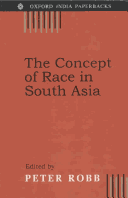SOAS Studies on South Asia
2 total works
South Asia has always played a part in the European imagining of race, but has not been much considered in the scholarly literature of the present generation. Nor, recently, have concepts of race figured very prominently in South Asian studies. This volume constitutes an attempt to raise the question comparatively, and over a long time-span, with regard to South Asia.
This volume, commemorating nearly forty years during which Professor K.A. Ballhatchet taught at the School of Oriental and African Studies in London, offers varied but coherent studies relevant to questions of ethnicity in South Asia. It goes beyond the recognition that identities are constructed, towards an understanding of the context and conditions in which particular kinds of community are possible. A secondary theme is the means and importance of the interpretation of texts. A third is the impact of the intrusions of colonial rule upon South Asian practices and self-perceptions. The subjects are considered from pre-Mughal times to the recent past, and in both India and Sri Lanka. The contributors are K.N. Chaudhuri on the idea of the barbarian; Peter Hardy on Indo-Muslim historical writing; Avril Powell on conversions from Islam to Phristianity; John Rogers on European perceptions of, and A,P.
Kannangara on caste rhetoric in, Sri Lanka; Peter Robb on the early impact of British rule on Muslims; Geoffrey Oddie on book-swinging; Ian Catanach on plague and Bombay communities; Dagmar Engels on childbirth and Bengali women; and Rosalind O'Hanlon on approaches to communalism in Western India. Peter Robb provides a critical introduction.
Kannangara on caste rhetoric in, Sri Lanka; Peter Robb on the early impact of British rule on Muslims; Geoffrey Oddie on book-swinging; Ian Catanach on plague and Bombay communities; Dagmar Engels on childbirth and Bengali women; and Rosalind O'Hanlon on approaches to communalism in Western India. Peter Robb provides a critical introduction.

